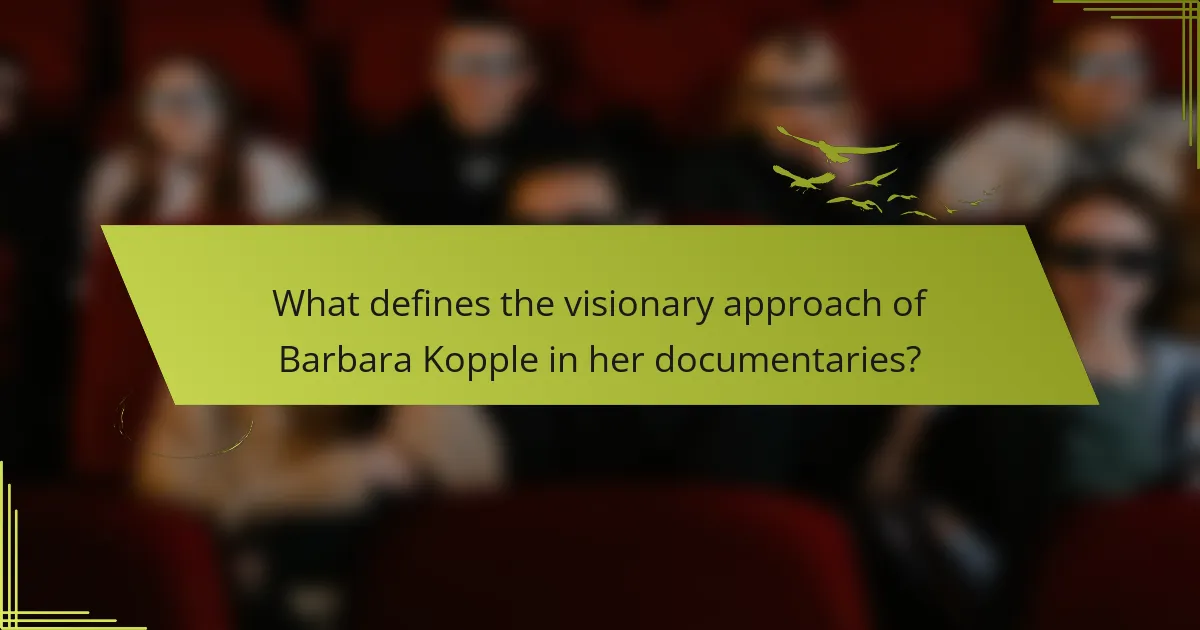
What defines the visionary approach of Barbara Kopple in her documentaries?
Barbara Kopple’s visionary approach in her documentaries is defined by her immersive storytelling and focus on social issues. She often highlights the struggles of marginalized communities. Her films, such as “Harlan County, USA,” showcase labor disputes and the human cost of economic hardship. Kopple employs a cinéma vérité style, capturing real-life events as they unfold. This technique allows viewers to connect deeply with her subjects. Her commitment to authenticity is evident in her long-term engagement with the communities she documents. She often emphasizes empathy and human resilience in her narratives. Kopple’s work has garnered multiple awards, reinforcing her impact in the documentary genre.
How does Barbara Kopple’s background influence her documentary style?
Barbara Kopple’s background significantly influences her documentary style. She grew up in a middle-class Jewish family in New York City. This upbringing exposed her to diverse cultures and social issues. Kopple’s education at the University of Massachusetts helped shape her understanding of storytelling. Her early work in the 1970s focused on labor movements and social justice. This focus reflects her commitment to marginalized communities. Furthermore, her experience working with various film formats allows her to blend cinematic techniques effectively. Kopple’s documentaries often emphasize emotional depth and authenticity. This approach resonates with audiences and highlights real-life struggles.
What personal experiences shape her perspectives in filmmaking?
Barbara Kopple’s perspectives in filmmaking are shaped by her personal experiences as a documentarian. Growing up in a politically active family influenced her focus on social issues. Her early exposure to diverse communities fostered a deep understanding of different cultures. Working on films like “Harlan County, USA” highlighted the struggles of marginalized workers. These experiences instilled a commitment to authenticity in storytelling. Her background in journalism further honed her investigative skills. Kopple’s passion for advocacy is evident in her choice of subjects. Each project reflects her dedication to giving voice to the voiceless.
How does her education contribute to her documentary techniques?
Her education significantly shapes her documentary techniques. Barbara Kopple studied at Boston University, where she earned a degree in Film and Television. This formal training provided her with a foundational understanding of storytelling, cinematography, and editing. Her education emphasized the importance of narrative structure, which she applies in her documentaries to create compelling stories. Additionally, she learned to analyze social issues critically, enhancing her ability to address complex themes in her work. Kopple’s educational background equips her with the technical skills and theoretical knowledge necessary for impactful documentary filmmaking.
What themes are prevalent in Barbara Kopple’s documentaries?
Barbara Kopple’s documentaries predominantly explore themes of social justice and human rights. Her work often highlights the struggles of marginalized communities. Kopple frequently addresses labor issues, as seen in “Harlan County, USA.” This documentary focuses on a coal miners’ strike and the fight for better working conditions. Another prevalent theme is resilience in the face of adversity, showcased in “American Dream.” This film documents the challenges faced by workers in a meatpacking plant. Additionally, Kopple examines the impact of personal stories on broader societal issues. Her films often blend personal narratives with political commentary, creating a powerful emotional connection.
How does social justice manifest in her work?
Social justice manifests in Barbara Kopple’s work through her focus on marginalized communities. She highlights struggles faced by workers, women, and minorities. Her documentaries often address systemic inequalities and injustices. For instance, “Harlan County, USA” documents labor strikes and workers’ rights. This film won an Academy Award, showcasing its impact. Kopple’s storytelling emphasizes empathy and human connection. She uses her platform to amplify voices often overlooked. Her commitment to social justice is evident in her choice of subjects and themes.
What role does activism play in her storytelling?
Activism is central to Barbara Kopple’s storytelling. Her documentaries often highlight social injustices and marginalized voices. Kopple uses film as a platform for advocacy and change. For instance, her work on “Harlan County, USA” focuses on coal miners’ struggles. This film won an Academy Award and brought attention to labor rights. Kopple’s storytelling aims to inspire viewers to engage with social issues. She believes in the power of film to influence public opinion and policy. Her commitment to activism shapes the narratives she chooses to tell.
How does she portray the human experience in her films?
Barbara Kopple portrays the human experience in her films through intimate storytelling and authentic character exploration. She focuses on real-life struggles and triumphs faced by individuals. Kopple often highlights themes of resilience, community, and social justice. Her documentaries, such as “Harlan County, USA,” depict the lives of coal miners fighting for their rights. This film won the Academy Award for Best Documentary Feature in 1977. Kopple’s work emphasizes emotional depth and personal narratives. She uses firsthand accounts and interviews to create a connection with the audience. This approach allows viewers to empathize with diverse human experiences.

What awards has Barbara Kopple received for her documentaries?
Barbara Kopple has received multiple prestigious awards for her documentaries. She won two Academy Awards for Best Documentary Feature. These were for “Harlan County, USA” in 1976 and “American Dream” in 1990. Kopple has also received numerous Emmy Awards. She won the Emmy for Outstanding Individual Achievement in a Craft: Directing for a Miniseries or Special in 1991. Additionally, she received the George Foster Peabody Award for her work. Her documentaries have been recognized for their impactful storytelling and social relevance.
Which notable accolades highlight her contributions to documentary filmmaking?
Barbara Kopple has received numerous accolades for her contributions to documentary filmmaking. She won two Academy Awards for Best Documentary Feature. The first was for “Harlan County, USA” in 1976. The second was for “American Dream” in 1990. Kopple’s work has also earned her multiple Emmy Awards. She has received the Peabody Award for her significant impact on the genre. Additionally, she was honored with the International Documentary Association’s Career Achievement Award. These accolades underscore her influence and commitment to documentary storytelling.
What specific films have garnered significant recognition?
“American Dream” and “Harlan County, USA” are specific films by Barbara Kopple that have garnered significant recognition. “Harlan County, USA” won the Academy Award for Best Documentary Feature in 1977. This film highlights the struggles of coal miners and their families. “American Dream” received the Academy Award for Best Documentary Feature in 1991. It focuses on the labor strike at a Hormel Foods plant. Both films showcase Kopple’s commitment to social issues and human rights. They have been praised for their powerful storytelling and impact.
How do these awards reflect her impact on the documentary genre?
Barbara Kopple’s awards signify her profound influence on the documentary genre. Her two Academy Awards for Best Documentary Feature highlight her ability to tackle complex social issues. These accolades reflect her commitment to authenticity and storytelling. Kopple’s films, such as “Harlan County, USA,” showcase the struggles of working-class communities. This focus on real-life narratives has inspired a new generation of filmmakers. Her recognition emphasizes the importance of documentary as a tool for social change. Additionally, her numerous other awards, including Peabody and Emmy Awards, further validate her impact. Overall, these honors illustrate how Kopple has shaped documentary filmmaking through powerful, engaging content.
How do her awards relate to the themes she explores?
Barbara Kopple’s awards highlight her commitment to social justice and human rights themes. Her documentaries often focus on marginalized communities and labor struggles. Winning Academy Awards for “Harlan County, USA” and “American Dream” underscores her dedication to these subjects. These films expose injustices and advocate for the oppressed. The recognition she receives amplifies the impact of her themes. Awards validate her work and inspire further exploration of critical issues. Kopple’s accolades reflect a synergy between her artistic vision and the social narratives she passionately portrays.
What patterns can be observed between her thematic focus and award recognition?
Barbara Kopple’s thematic focus often aligns with social justice and human rights issues. This focus has led to significant award recognition. For instance, her documentary “Harlan County, USA” won the Academy Award for Best Documentary Feature in 1977. The film highlights labor struggles, which resonates with her commitment to portraying marginalized voices. Similarly, “American Dream,” which examines the meatpacking industry, received an Academy Award in 1991. The consistent recognition of her work correlates with her dedication to impactful storytelling. Kopple’s films often address themes of resilience and community, which are celebrated by critics and audiences alike. This pattern indicates that her thematic choices directly influence her success in award circuits.
How do critics and audiences respond to her thematic choices?
Critics and audiences generally respond positively to Barbara Kopple’s thematic choices. Her documentaries often highlight social justice issues and human resilience. Critics praise her ability to present complex narratives with emotional depth. Audiences resonate with her authentic storytelling and relatable characters. For example, “Harlan County, USA” received an Academy Award for Best Documentary. This film illustrates the struggles of coal miners, capturing both their hardships and solidarity. Critics noted its powerful portrayal of labor rights. Audiences appreciated the film’s raw and honest depiction of real-life events. Overall, Kopple’s thematic choices foster empathy and provoke thoughtful discussions among viewers.

What can aspiring filmmakers learn from Barbara Kopple’s approach?
Aspiring filmmakers can learn the importance of authenticity from Barbara Kopple’s approach. Kopple emphasizes capturing real-life stories and experiences. She often immerses herself in the subjects she documents. This method fosters trust and genuine representation. Her film “Harlan County, USA” exemplifies this commitment to authenticity. It won an Academy Award for Best Documentary in 1977. Kopple’s focus on social issues is also a key lesson. She highlights marginalized voices and brings attention to important causes. This dedication can inspire filmmakers to pursue meaningful narratives. Ultimately, Kopple’s approach teaches the value of storytelling that resonates with audiences.
What best practices can be adopted from her documentary style?
Best practices from Barbara Kopple’s documentary style include immersive storytelling and authentic character development. Kopple often focuses on real-life struggles, creating emotional connections with the audience. She emphasizes thorough research, ensuring factual accuracy and context in her narratives. Utilizing a cinéma vérité approach, she captures spontaneous moments, enhancing realism. Her documentaries often feature diverse perspectives, allowing for a multi-faceted view of issues. Engaging visuals and sound design are also key elements, drawing viewers deeper into the subject matter. Each of these practices contributes to the impactful storytelling for which Kopple is renowned.
How can filmmakers effectively incorporate social themes into their work?
Filmmakers can effectively incorporate social themes into their work by grounding narratives in real-life issues. This involves researching the social themes they wish to explore. For instance, Barbara Kopple’s documentaries focus on labor rights and community struggles. Filmmakers should engage with affected communities to ensure authenticity. They can use interviews and firsthand accounts to provide depth. Visual storytelling techniques can highlight emotional aspects of these themes. Utilizing symbolism and metaphors can also enhance the message. Furthermore, collaborating with activists can lend credibility to the project. By presenting facts alongside personal stories, filmmakers create a compelling narrative that resonates with audiences.
What strategies should be considered for impactful storytelling?
Impactful storytelling requires a clear narrative structure. This includes a beginning, middle, and end to guide the audience. Engaging characters are essential; they create emotional connections. Authenticity in storytelling enhances credibility and relatability. Utilizing vivid imagery helps paint a picture in the audience’s mind. Incorporating conflict or tension keeps the audience invested in the outcome. Themes that resonate with universal human experiences can create deeper connections. Finally, a strong conclusion reinforces the story’s message and leaves a lasting impression. These strategies contribute to effective storytelling by ensuring clarity, engagement, and emotional resonance.
The main entity of the article is Barbara Kopple, a renowned documentary filmmaker known for her visionary approach. The article provides an overview of Kopple’s documentary style, emphasizing her focus on social issues, immersive storytelling, and commitment to authenticity. It highlights her significant works, including “Harlan County, USA” and “American Dream,” which explore themes of social justice and human rights. Additionally, the article discusses the awards Kopple has received, such as two Academy Awards, and examines how her background and education have shaped her filmmaking techniques. Overall, it outlines the impact of her work on the documentary genre and offers insights for aspiring filmmakers.